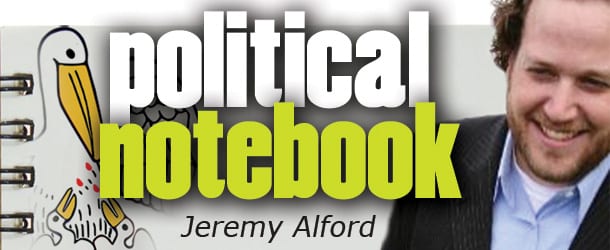The House and Governmental Affairs Committee has been debating several different bills aimed at reforming how the Legislature does its job. It’s rejected many of them, but it did advance a framework for a possible constitutional convention. HB 733 by Ways and Means Chairman Neil Abramson, D-New Orleans, would leave it up to an “Evaluation and Drafting Committee” to determine if a convention is really needed — and if it is, then, and only then, would it be called. The study group would develop a plan and a draft constitution that would be debated and voted on by 123 delegates, of which 105 would be elected from existing House districts and 18 would be appointed. Abramson said the state’s guiding charter, drafted in 1974, has become bloated with 183 amendments lawmakers have sent to voters. “We put everything in the Constitution — even things that shouldn’t be in there,” he said. If his bill passes, and the study committee calls for a convention, it would lead to a new constitution by May, 2018. The measure has been recommitted to the Appropriations Committee for another hearing. If passed there, it would then move to the House floor.
Should Online Retailers Track La. Purchases?
The state House of Representatives will soon hear a bill that would require online retailers such as Amazon to track purchases made by Louisiana residents and report to the state how much in sales taxes the consumer owes. Approved by the Ways and Means Committee with no objection, the bill would force online retailers to notify customers of their obligation to report their purchases, which would be accomplished with a simple document that would arrive inside shipping boxes and alongside purchases. The bill was introduced by Speaker Pro Tem Walt Leger, D-New Orleans, who was also the author of Act 22 from the first special session earlier this year. That act, passed by the House and Senate and endorsed by the governor, created a framework for collecting Internet sales taxes. Leger is now trying to build on it with HB 1121. Act 22 simply requires out-of-state online retailers with contract affiliates in Louisiana to collect and remit sales taxes. Local governments and the state are splitting the collected 8 percent sales tax. “I think we all knew at the time this wouldn’t solve the problem entirely,” said Leger, noting sales taxes have always been due on such purchases, but there were collection challenges. The new system has only been in place for roughly a month, but Leger sees an opportunity to expand on it by implementing a nexus model from Colorado that has been upheld by the 10th Circuit Court of Appeal. Like Act 22, Leger’s HB 1121 would only apply to remote retailers that do $50,000 worth of business in Louisiana annually. Unlike Act 22, it doesn’t matter if they have contract affiliates here. So the bill casts a wide net, and would capture major internet players, such as Amazon. The legislation would require online retailers to submit to the Dept. of Revenue a list of all customers who have made purchases greater than $250. It has some bipartisan support, with Rep. Pat Connick, R-Metairie, deciding not to file a similar measure, and throwing support to the bill by Leger. In Colorado, Amazon recently decided to stop sending the state its list of customers and has begun collecting sales taxes on behalf of the state. Some studies have suggested Louisiana could receive up to $75 million annually if just Amazon, and no other online retailers, do the same here. “It’s hard to even know how much money it would bring in. But this is a step in the right direction,” said Leger.
Budget Brawl
In a dramatic shift away from the Edwards administration’s priorities, the House Appropriations Committee advanced a state budget that gives the attorney general autonomous spending control; eliminates the office of inspector general; reverses cuts to a free college tuition program; and reallocates funding reductions for safety-net hospitals. In recent history, the Appropriations Committee has traditionally rubber-stamped the executive budget proposal presented by the sitting governor. But this session, its final actions on HB 1, which contains the budget, could be charting a course for a political collision with the House on one side and the Senate and Gov. John Bel Edwards on the other. The budget changes were driven by Appropriations Chairman Cameron Henry, R-Metairie, and were a surprise to many on the committee who had no clue such sweeping alterations were in store. The budget bill moved to the House, which has a solid conservative majority. Edwards, the first Democratic governor to be elected in the Deep South in 12 years, seems to have more support in the Senate, which will likely make its changes to the budget bill. Those changes will be more in line with what the governor initially proposed. Speaking with reporters at the Baton Rouge Press Club about the committee vote, Edwards said he had some concerns with the suggested changes, and described the across-the-board cuts and the reshuffling of offices as “not the right thing to do.” The biggest surprise to come out of the first committee vote involved removing the office of the attorney general from the main budget bill in HB 1 and allowing it to have its own stand-alone appropriations bill. “We want to try budgeting differently than we have in the past,” Henry said of the change, adding it would give the attorney general more flexibility. It would also give the Division of Administration, which is the governor’s budgeting arm, less authority over controlling the attorney general’s spending. Rep. Pat Smith, D-Baton Rouge, suggested such a move would push Attorney General Jeff Landry toward becoming a “loose cannon.” Speaker Pro Tem Walt Leger, D-New Orleans, said that a stand-alone budget could face constitutional challenges down the line. Landry’s office, which requested the amendment, released this comment to reporters: “The attorney general is a separate, elected constitutional officer.” Breaking from others who preceded him, Landry has been taking more initiative during his first year in office to intervene in cases the state is involved with. And he’s repeating his position that he has the constitutional authority to do so with or without input from the governor. Landry’s ability to control his own budget rather than be part of the executive budget proposal is an extension of this developing political narrative. Another budget amendment eliminated all funding for the inspector general’s office, which operates as an independent watchdog agency. Supporters argued that the office duplicates services already offered by state police, the attorney general and legislative auditors. Inspector General Stephen Street said his office actually generates money for the state, and is the only investigative arm with no political ties. Eliminating an office that can actually investigate the Legislature sends a bad message, he said. “The optics of that are horrible for our state,” Street said. After Edwards downsized the free college tuition program by $183 million in his executive budget proposal, the committee voted to reverse that reduction and found the money needed to make TOPS whole. The money was taken from various departments and agencies using across-the-board cuts. In other action, the committee also voted to overturn Edwards’ decision to fund only five of the state’s nine safety net hospitals. Instead, members reallocated that overall funding reduction in such a way that all the hospitals would have to share in the cuts.
Former Jindal Aide Opens Shop
Mike Reed, who served as former Gov. Bobby Jindal’s communications director, has launched a strategy and research firm called River Delta Strategies. Reed said the firm will serve both corporate and political clients, offering public relations, government relations and public affairs strategy. It will also specialize in opposition research, policy analysis and legislative tracking services. The Boston native, who has worked in D.C., said he hopes to help clients at the federal and state levels.
Big Business: No Settlement On Coastal Suits
Now that the state has intervened in the high-profile lawsuits filed by three coastal parishes against dozens of oil and gas companies, will Louisiana officials negotiate a global settlement? The idea that such negotiations could take place is “absolutely false,” according to a letter sent to parish presidents and local officials by the Louisiana Assoc. of Business and Industry; the Louisiana Mid-Continent Oil and Gas Assoc.; and the Louisiana Oil and Gas Assoc. “In some instances, local officials have even been encouraged to file new lawsuits they weren’t even contemplating or to reinstate lawsuits they had already rescinded out of fear that they may be ‘left out’ of settlement negotiations,” the letter reads. The letter goes on, “Whatever their outcome, these lawsuits are not a funding mechanism for state or local government budgets, including parish general funds.” Sales Tax Fixes Await Action Feeling that the temporary increases in sales taxes, from Act 25 from the first special session earlier this year, had a few unintended consequences, Reps. Jay Morris, the original author, and Phillip DeVillier are pushing proposed rebates for agriculture and automobile interests. Two bills have been assigned to the Ways and Means Committee. Morris, R-Monroe, has HB 1011, which is a rebate for agriculture manufacturing machinery and equipment. The author said the bill wasn’t supposed to be subject to the new temporary sales tax increase. Morris is unsure how much money his bill would deduct from the revenue the state is expecting to receive from Act 25. He’s more concerned with making sure his bill, should it move, will not be loaded down with amendments seeking to protect other interests. “No hitchhikers,” he said, promising to keep his bill clean if it advances. DeVillier, R-Eunice, said he would take a similar approach to his HB 1055, which would offer a rebate for sales taxes applied by automobile dealers to their manufacturer’s rebates. “That’s not something we’ve ever taxed,” said DeVillier, who was asked by a local dealer in his district to look into the issue. Holden Ready For Congressional Run As the contest to succeed him shapes up in his hometown, Baton Rouge Mayor Kip Holden is looking more and more like a southeast Louisiana congressional candidate. He told LaPolitics last month that he would be a candidate in the 2nd Congressional District, but later told a Red Stick newspaper that he wasn’t 100 percent sure. Either way, Holden filed the paperwork for his campaign committee — “Melvin Kip Holden For Congress” on April 19. Should he qualify, Holden will be running against incumbent Congressman Cedric Richmond in a district that has long favored New Orleans pols. However, it was redrawn to include parts of the greater Baton Rouge region and some rural parishes. Both Holden and Richmond are Democrats.
For more Louisiana political news, visit www.LaPolitics.com or follow Jeremy Alford on Twitter @LaPoliticsNow.














Comments are closed.